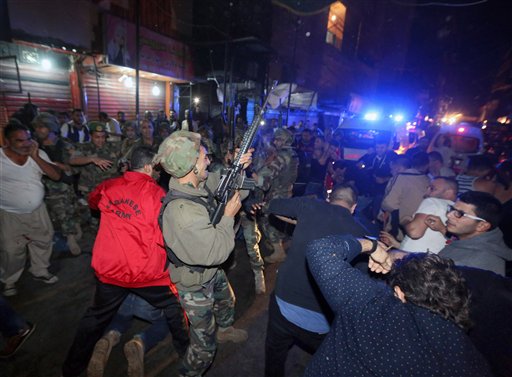
The twin attack, which killed 43 people and injured 239 others and rocked the Beirut southern suburb of Bourj al-Barajneh was strongly condemned by Lebanese leaders who called for unity and vigilance.
The attack was carried out by two suicide bombers who blew up their explosive vests in the Ain al-Sikkeh street. The army said the dead body of a third attacker who failed to blow himself up was found on the scene of the second blast.
Prime Minister Tammam Salam declared Friday a day of national mourning and called on all Lebanese to show more “alert, unity and solidarity in the face of the seditious schemes.”
He hoped the attacks will push all officials to “overcome disputes and support state and security institutions so that we can all protect our domestic front and immunize it in the face of the terrorist assault.”
Former PM Saad Hariri, who leads a political bloc opposed to Hezbollah and its allies, condemned the blast as “vile and unjustified”.
The March 14 General Secretariat meanwhile condemned “the return of the bombings to the Dahieh region,” voicing its solidarity with the families of the victims.
The general secretariat also noted that “stability in Lebanon is not merely a technical process based on the ability of a security force to protect its regions, but rather on consensus on the need to build the State, in the vein of what happened today in parliament.”
It called on Hezbollah to “withdraw from the Syrian conflict, which is clearly firing back at those who are involved in it.”
Change and Reform bloc chief MP Michel Aoun , Hezbollah’s Christian ally meanwhile described the attacks as “a crime of despair after defeat.”
“We must fight with all due confidence so that good can triumph over evil,” he told OTV.
Meanwhile, Lebanese Forces leader Samir Geagea who is opposed to Hezbollah issued a statement condemning the blasts “in the strongest terms” and urging Lebanese to close ranks.
He also called on the government to “hold an emergency and extraordinary meeting in order to take more measures aimed at protecting Lebanon and the Lebanese.”
Progressive Socialist Party leader MP Walid Jumblat also condemned the attack and called for “rising above narrow and partisan political disputes in order to immunize the Lebanese arena and prevent a new wave of terrorist bombings.”
Grand Mufti Sheikh Abdul Latif Daryan, the highest Sunni spiritual authority issued a statement condemning the attack as “black terrorism” and urging “Islamic unity and national unity.”
“The domestic arena must be protected with further awareness, solidarity and unity,” he said.
French President Francois Hollande also condemned the attack as “despicable”.
The blast, which was claimed by the extremist Islamic State group, is the first to target Beirut’s southern suburbs since June 2014.
“Soldiers of the Caliphate” detonated explosives planted on a motorbike in an area frequented by Shiites, using a derogatory term to refer to the sect, the IS statement said.
“After the apostates gathered in the area, one of the knights of martyrdom detonated his explosive belt in the midst of them,” the IS statement added.
But prior to that, a string of attacks targeted Hezbollah strongholds throughout the country.
Between July 2013 and February 2014, there were nine attacks that targeted Hezbollah bastions, most claimed by jihadist extremists.
The groups claimed the attacks were in revenge for Hezbollah’s decision to send thousands of fighters into neighboring Syria to support President Bashar Assad’s forces against an Islamist-dominated uprising.

Leave a Reply
You must be logged in to post a comment.